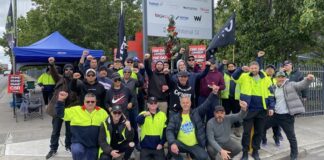Mountain of scrapped bikes as bike-sharing companies go bust
Chinese cities have been swamped by a massive over-supply of dock-less bikes as bike-sharing companies go bust. Bike-sharing allows users to rent bikes with their smart-phones and leave them in parking zones around cities. At least four companies are now competing in Sydney.
The mad rush of investment into bike-sharing start-ups in China has seen 40 companies competing in a wildly oversaturated market. In the last 18 months $2.64 billion in investment has flooded into the industry. Companies are spending up big to roll out in new cities in a rush to grab market share. But it’s not clear how many of the operators can actally make money.
The result has been increasing numbers of companies going under. Fortune has written that, “Many analysts predict the industry is headed for a bloody consolidation in which only one or two players survive.”
In November Guangzhou based Mingbike ceased operations, as did Bluegogo, China’s third largest bike-sharing company, after burning through $119 million in venture capital. In the last six months Wukong, 3VBike and DingDing have also collapsed.
In Xiamen in South Eastern China there is now a mountain of discarded dock-less bikes the size of a football pitch. It is so high cranes are needed to reach the top.
School cleaners told to reapply for jobs
Seven thousand school cleaners in NSW will be forced to reapply for their jobs if Liberal government plans go ahead. In late November the NSW Department of Finance Services notified the cleaners’ union, United Voice, that employment guarantees in place since 1994 would be scrapped from 2018. Currently cleaners are employed by private companies but contracts contain guarantees. Workers will also lose entitlements like sick leave built up over time.
Many have spent years or decades in their positions, but the “spill and fill” will mean many lose their jobs as they are older migrants less and likely to be re-hired. The government will also change the “pricing model” in contracts so cleaners are paid per square meter rather than per hour. This will lead to under-staffing and unsanitary schools.
Alison Redman has cleaned schools for seven years in Western Sydney. She told Fairfax, “I am one of the youngest cleaners and I am 41. People are not going to want to employ older people, they are going to want to employ younger people.
“It will be difficult finding another job when you have been in the cleaning industry for a long time as most cleaners have.”
United Voice is holding meetings of cleaning workers across NSW to discuss a campaign.
Centrelink use labour hire to chase welfare debts
The Department of Human Services (DHS) will enlist 1000 labour-hire workers at Centrelink enforcing compliance and collecting debts from early 2018. This comes in the wake of an October DHS decision to outsource call centre operations employing 250 staff to multi-national Serco.
Nadine Flood, Community and Public Sector Union National Secretary, described the labour hire contract as “scandalous” and said the jobs should be done by “well trained public servants”. Labour hire is being used as part of the crackdown on welfare recipients announced in the May budget. This is the same crackdown that led to the “robo-debt” scandal earlier in the year.
Queensland apprentices owed $100 million
The Federal Court has confirmed that Queensland apprentices and trainees should be paid higher rates under the Federal award rather than under the defunct state award. According to the ETU this leaves bosses open to challenges that would see tens of thousands of apprentices seeking an estimated $100 million in back-pay going back to January 2014. A similar Fair Work ruling in August was challenged by All Trades Queensland, the Master Builders Association and the Housing Industry Association. Companies argued they should be able to pay Queensland apprentices $8.75 an hour, more than $4 less than in other states.
Queensland CFMEU State Secretary Michael Ravbar said, “This will mean pay rises of a couple of hundred dollars a week to some apprentices, along with opening the door for sizeable back pay claims, which is game changing for people earning less while they learn.”
Cops with military-grade weapons to patrol Darwin
Camouflaged police equipped with military-grade assault weapons are set to patrol the streets of Darwin and Alice Springs at night. The Territory Response Group (TRG) tasked with the patrols is part of the government’s national counter-terrorism taskforce.
The move is clearly aimed at Aboriginal kids, following a panic about youth crime. Patrols will be most concentrated in the Christmas period, with Police Commissioner Reece Kernshaw citing the threat of, “kids jumping onto roofs of hotels and stealing people’s wallets and all sorts of things”. The choice to deploy the group was not based, “strictly on pure evidence”, he said. It comes after racist vigilante groups organised attacks on Aboriginal children in Alice Springs in recent months.
Kernshaw admitted the task force “may be” armed with assault weapons when approaching kids as young as 10. There are reports of the TRG already operating in the Aboriginal community at Tennant Creek, where they imposed a curfew on the entire local population.
Shoppers find notes from exploited workers in their clothes
Shoppers at fashion retailer Zara have found pleas for help sewn into their new clothes. Zara has 2200 stores worldwide and an estimated worth of $15.2 billion. It has Australian stores in Melbourne’s Bourke Street and Pitt Street Mall in Sydney. The notes, found by customers in Istanbul, came from workers at Turkish manufacturer Bravo Teksil and say, “I made this item you are going to buy but I didn’t get paid for it.”
Bravo Teksil shut down overnight, leaving all its workers unpaid. Zara has previously been sued over its working conditions and accused of using child labour.





